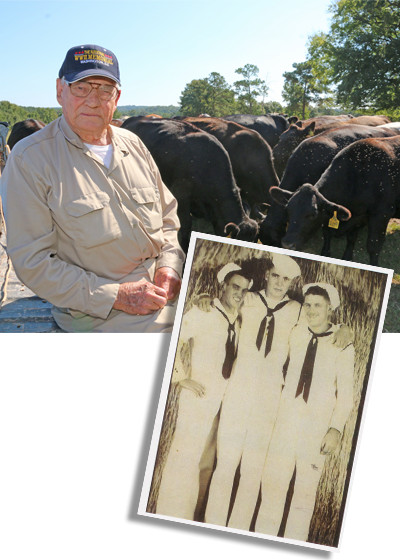American Made: Remembering Veterans Who Kept Us Free

It was a humid fall day as 90-year-old veteran James Roy Colquitt maneuvered his truck close to a heifer struggling to give birth. His watchful eye and experience led him to announce it was probably a bull calf trying to make its way into the world.
He was right. An hour later, a black, wobbly-legged calf was nuzzling its mama looking for his first meal.
“That’s what I enjoy most about this job,” he said. “Watching God’s creation never gets old even though I’ve seen it hundreds of times.”
A native of Pike County, Colquitt’s family relocated to rural Russell County near Seale when he was 5. A few months later, a son was born to a neighboring family. His name was Sonny Corcoran. Although six years separated the boys, they shared a lifelong friendship.
Today, Colquitt helps tend his late friend’s farm as he recalls those who fought to preserve his freedom to do what he loves.
Colquitt enlisted to fight in World War II in 1944, just days after finishing 10th grade.
“When we were growing up, we watched soldiers at Ft. Benning dig foxholes in red clay for days on end,” said Colquitt, who was one of 10 children. “My (two older) brothers joined the Navy because they didn’t want to dig holes. I joined the Navy because that’s what they did.”
Colquitt was sent to San Diego for boot camp and amphibious training. He was deployed on an LST, a tank landing ship that carried vehicles, cargo and troops. He first went to Pearl Harbor, then to Okinawa, Japan.
“I remember Japanese suicide planes coming the second day we were in Okinawa,” he recalled. “Every gun we had was firing on a plane that exploded right next to our ship. The plane was trying to drop bombs on the ammunition we had carried to shore, but it didn’t matter. In our mind, they were trying to kill us.”
Colquitt said the LST was filled with troops prepared for a mainland invasion, a scenario that struck fear in the hearts of young sailors.
“We were told that if the U.S. invaded Japan, a half million of us wouldn’t make it back alive,” he said. “Then we (the U.S.) dropped the atomic bombs that ended the war. Our ship picked up Japanese from outlying islands and took them to occupational forces.”
After being honorably discharged in 1946, Colquitt returned to Seale and married Mary Elizabeth Gleaton (now deceased). He later took a job with the U.S. Conservation Service in Butler County, trapping and relocating whitetail deer and wild turkeys to national forests in Alabama.
When he retired from the conservation department, Colquitt worked for Union Camp Corp. in Chapman and raised beef cattle before retiring again. He moved back to Seale, and his friendship with Sonny Corcoran was renewed.
“Sonny kept asking me to come work for him and help Tom (Sonny’s son) with the cows,” Colquitt said. “Finally, when I was 68, I started working here, and I’ve been here ever since.”
Originally, Colquitt mended fence, fed cows and delivered calves. His main job these days is to check on the farm’s 850 beef cows, but his experience is hard to put a price on, said Tom Corcoran.
“Mr. Roy is an amazing man,” Corcoran said. “If it has to do with a cow, he’s just about seen it or done it. He’s a lot more than an employee — he’s like a family member. His dedication to our family, his job and our country is undeniable. People like him are hard to find.”
Colquitt, who has two daughters and three grandchildren, said for years it was hard to talk about his military service. He still chokes up when he recalls the young men who died.
“We didn’t talk about the war because we just wanted to forget about those hard times,” he said.
But each Veterans Day, Colquitt remembers those who served with him.
“I think about the war and all those young men who never made it back,” Colquitt said. “It makes me sad, but it also makes me proud of them. They fought for our country and the freedoms we have. I’m not a hero. I’m just proud to be a good ole American boy. They were the real heroes.”
